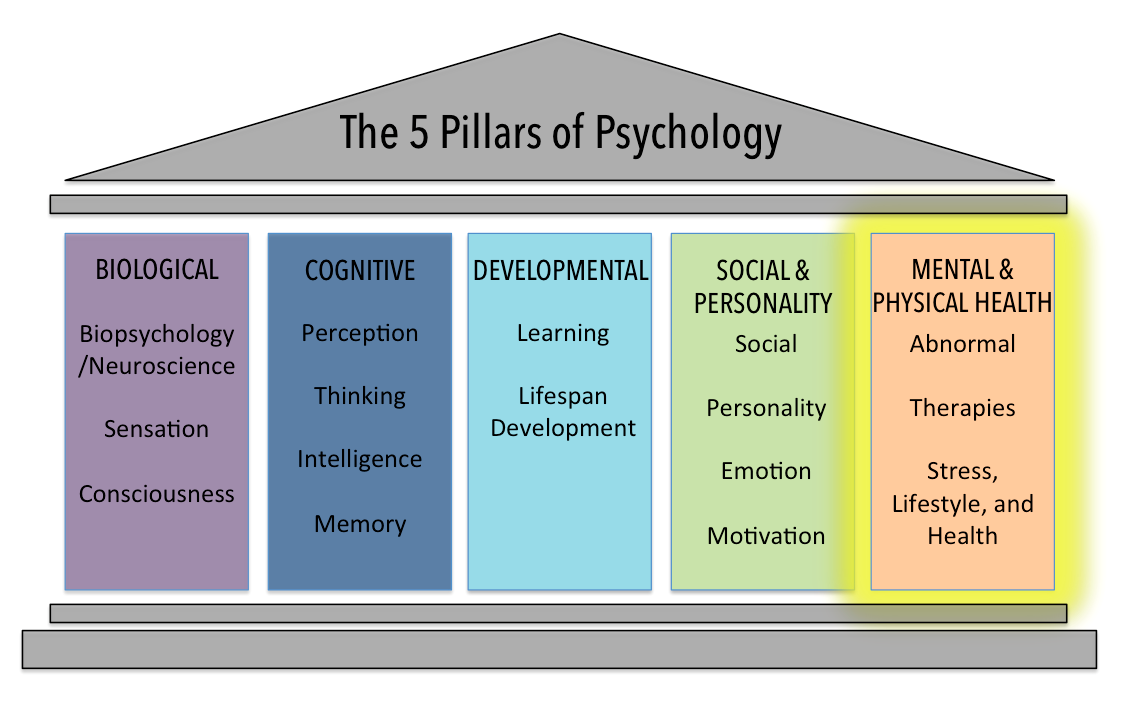Pillar V: Mental and Physical Health
Learning Objectives
- Describe the basic interests and applications of abnormal, clinical, and health psychology

This domain of psychology is what many people think of when they think about psychology—mental disorders and counseling. This includes the study of abnormal psychology, with its focus on abnormal thoughts and behaviors, as well as counseling and treatment methods, and recommendations for coping with stress and living a healthy life.
The names and classifications of mental disorders are listed in the Diagnostic and Statistical Manual of Mental Disorders (DSM). The DSM is currently in its 5th edition (DSM-V) and has been designed for use in a wide variety of contexts and across clinical settings (including inpatient, outpatient, partial hospital, clinic, private practice, and primary care). The diagnostic manual includes a total of 237 specific diagnosable disorders, each described in detail, including its symptoms, prevalence, risk factors, and comorbidity. Over time, the number of diagnosable conditions listed in the DSM has grown steadily, prompting criticism from some. Nevertheless, the diagnostic criteria in the DSM are more explicit than those of any other system, which makes the DSM system highly desirable for both clinical diagnosis and research.

Clinical Psychology

By far, this is the area of psychology that receives the most attention in popular media, and many people mistakenly assume that all psychology is clinical psychology.
Health Psychology
Health psychology focuses on how health is affected by the interaction of biological, psychological, and sociocultural factors. This particular approach is known as the biopsychosocial model. Health psychologists are interested in helping individuals achieve better health through public policy, education, intervention, and research. Health psychologists might conduct research that explores the relationship between one’s genetic makeup, patterns of behavior, relationships, psychological stress, and health. They may research effective ways to motivate people to address patterns of behavior that contribute to poorer health (MacDonald, 2013).

Try It
Licenses and Attributions (Click to expand)
CC licensed content, Shared previously
- The Mental and Physical Health Domain. Authored by: Lumen Learning Provided by: Lumen Learning. License: CC BY: Attribution Located at: https://pressbooks.online.ucf.edu/lumenpsychology/chapter/reading-mental-and-physical-health-pillar/
- Psychology. Authored by: OpenStax College. Located at: https://openstax.org/books/psychology-2e/pages/1-3-contemporary-psychology. License: CC BY: Attribution. License Terms: Download for free at https://openstax.org/books/psychology-2e/pages/1-introduction
- Abnormal Psychology. Provided by: Boundless. Located at: https://www.boundless.com/psychology/textbooks/boundless-psychology-textbook/introduction-to-psychology-1/theoretical-perspectives-in-modern-psychology-23/abnormal-psychology-512-16738/. License: CC BY-SA: Attribution-ShareAlike
fullness; satisfaction
adult with a BMI between 25 and 29.9
